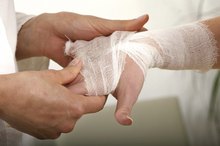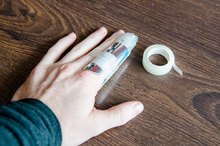How to Crack Your Knuckles Loudly
It's a common misconception that cracking your knuckles can cause arthritis. Cracking the joints in your fingers can actually relieve tension and pressure located in the hands. The popping noise heard when cracking your joints, occurs due to nitrogen being pulled into the joint through negative pressure 2. Cracking and popping sounds can also be heard when tendons snap over body tissues due of minor adjustments in their gliding paths. As a general rule, painless cracking of the knuckles is not seen a dangerous.
If you are experiencing serious medical symptoms, seek emergency treatment immediately.
Curl your left hand up into a closed fist with your thumb pointing away from the fingers; not tucked inside. Hold the left hand in front of your body and point it to your right. Your thumb should be pointing at your chest.
What Are the Causes of Bilateral Elbow Pain?
Learn More
Flatten your right hand into a straight edge with your fingers close together. Connect the base of your palm with the bent knuckles of your left hand.
Push very gently with the palm of your right hand to exert some pressure onto the bent knuckles of your left. Curl the fingers of your right hand over the closed fist, if you need more leverage.
How to Increase Flexibility in My Big Toes
Learn More
Crack your knuckles loudly by exerting more pressure over all four finger knuckles at the same time, until they crack. If done properly, you should hear the loud combined cracking of four joints and not just one.
Repeat with the right hand, but in the opposite directions.
Consult a doctor or medical professional, if you ever feel pain when cracking your knuckles. Pain may indicate underlying abnormalities in the structures of the joint; such as loose cartilage or damaged ligaments.
Tips
You can also gently pull on the ends of your fingers to stimulate a crack from the knuckles, although the sound is far quieter than pushing on them directly.
Sufferers of arthritis, bursitis or tendinitis are likely to hear involuntary cracking sounds due to the snapping or irregular swollen tissues in the joints.
Warnings
Do not force your joints to crack, if they are not making any noises -- doing so could lead to both temporary and permanent joint damage.
Related Articles
References
- Medicine Net; Joint Cracking... Fact & Fiction; 2004
- YouTube; How to Crack your Joints; 2010
- Effect of Habitual Knuckle Cracking on Hand Function. Annual of the Rheumatic Diseases. 1990 May;49(5):308-309.
- What Makes the Sound When We Crack Our Knuckles? Scientific American. October 26, 2001.
- Kevin deWeber, MD, FAAFP, Mariusz Olszewski, MD and Rebecca Ortolano, MD. Knuckle Cracking and Hand Osteoarthritis. J Am Board Fam Med March-April 2011 vol. 24 no. 2 169-174.
Tips
- You can also gently pull on the ends of your fingers to stimulate a crack from the knuckles, although the sound is far quieter than pushing on them directly.
- Sufferers of arthritis, bursitis or tendinitis are likely to hear involuntary cracking sounds due to the snapping or irregular swollen tissues in the joints.
Warnings
- Do not force your joints to crack, if they are not making any noises -- doing so could lead to both temporary and permanent joint damage.
Writer Bio
Matthew Caines began writing and editing in 2008 and has since gained valuable experience in the publishing industry working for national publications such as "The Guardian," "Sartorial Male," "AREA Magazine," "Food & Drink Magazine," "Redbrick Newspaper" and "REACH Magazine." He has a Bachelor of Arts in history from the University of Birmingham, U.K.








